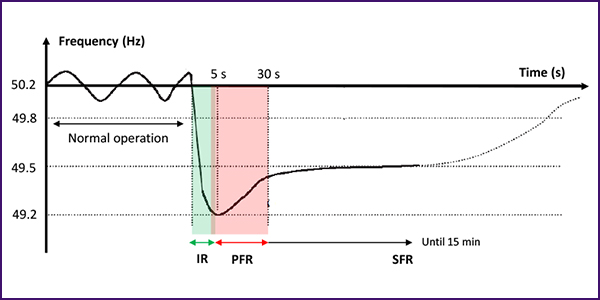By Rich Heidorn Jr.
The head of the standard drafting team considering modifications to NERC’s frequency response standard predicted generators will oppose a standard that mandates they provide the service.
Ethos Energy Group’s David Lemmons, chair of the team considering revisions to BAL-003-1.1 (Project 2017-01) said at least 60% of respondents to the group’s survey “said don’t do a generator requirement.”
“In the past, we’ve discussed issues that might be brought up related to the need for a governor requirement — one being: Performance is sufficient without it right now. Why are we trying to add more to it?” Lemmons said during a July 23 meeting.
The second objection has to do with transmission tariffs. Lemmons said a generation owner that is a load service provider recounted to him a conversation he had with his balancing authority.
“He said my BA came to me — he’s also my [transmission service provider] — and said my generator was not performing very well [in providing frequency response] and I have to improve. I said, ‘No I don’t. I’m paying for that [service] under … the tariff.”
Susan Morris, an electrical engineer in FERC’s Office of Electric Reliability, said she didn’t see the issue as an obstacle.
“The need for frequency response has been around for a long time. I wouldn’t worry about the tariff unless there is a direct conflict, and I don’t think there is. This is not a new need. I don’t see the correlation.”
“The generation owner’s paying for the service and he [says he] doesn’t need to provide it himself,” Lemmons persisted.
“Then that’s a problem there isn’t it? Maybe they need a requirement because [crafting a generator requirement] is the right thing to do for reliability,” Morris responded.
Lemmons asked NERC staff to provide an opinion on the issue “so that this team has it available for those comments when we receive them.”
FERC appears to have addressed the issue last year, when it ordered transmission providers to amend their pro forma generator interconnection agreements to require generators have governors or other equipment to respond automatically to frequency disturbances (Order 842, RM16-6).
In a subsequent rehearing order, the commission said its ruling did not imply existing generators are entitled to compensation for providing the service. FERC also rejected suggestions it had prohibited frequency response requirements on existing facilities, saying such a conclusion would be “inconsistent with the fundamental purpose” of ensuring reliability (RM16-6-001).
Consensus Reached
The existing BAL-003 standard requires balancing authorities or frequency response sharing groups, where applicable, to maintain interconnection frequency within predefined bounds.
Phase I of the BAL-003 project proposed changes to address inconsistencies in the calculations of interconnection frequency response obligations (IFRO).
Phase II of the BAL-003 project is considering potential changes to make IFRO calculations and associated allocations more reflective of current conditions, considering load response and the generation mix. The standard authorization request requires the team to ensure overperformance by one entity will not negatively impact the evaluation of performance by another and measurements of primary frequency response are considered in addition to those for secondary frequency response.
During a day-and-a-half of meetings last week, the standard drafting team reached consensus it does not want to impose a headroom requirement on generators, Lemmons said. The team considers that a decision the balancing authorities should make “based on economics or whatever process they use today.”
The team also decided to prohibit outer loop controls that defeat governors from responding, Lemmons said. Outer loop controls are used by generators that “don’t want their output to swing because of emissions issues [or because] the transmission tariff is telling the generator to be on schedule at all times,” he said.
The team also discussed changing the standard’s current requirement that FERC Form 1 data be used to monitor frequency response.
Lemmons said the team has discussed whether to recommend changing the current standard’s use of data from Frequency Response Survey (FRS) Form 1. The options being considered include an alternate data source or eliminating the data provision requirement.
We “don’t like the 1600 path,” Lemmons said, referring to the filing of a data request under section 1600 of the NERC Rules of Procedure. “We’re concerned a non-enforceable, non-push data gathering process may cause problems.”
Duke Energy’s Tom Pruitt urged the group to move forward in selecting one of the several proposals for modification of the standard.
“We’ve got some really sharp folks [on the team] but at the same time, we seem to just keep going around and around in circles, and I want to break the habit,” Pruitt said. “If you really want to get dramatic about it, call it an intervention.”





